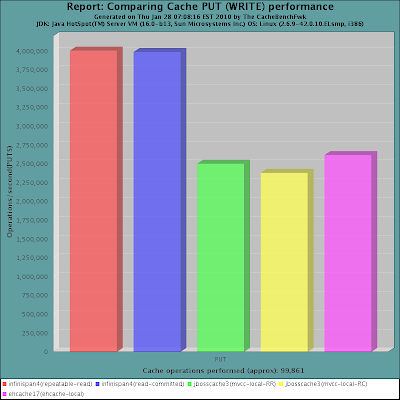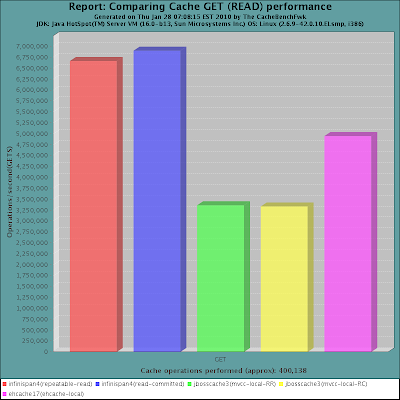Tuesday, 02 February 2010
Infinispan as a LOCAL cache
While Infinispan has got the distributed, in-memory data grid market firmly it in its sight, there is also another aspect of Infinispan which I feel people would find interesting.
At its heart Infinispan is a highly concurrent, extremely performant data structure than can be distributed, or could be used in a standalone, local mode - as a cache. But why would people use Infinispan over, say, a ConcurrentHashMap? Here are some reasons.
Feature-rich
-
Eviction. Built-in eviction ensures you don’t run out of memory.
-
Write-through and write-behind caching. Going beyond memory and onto disk (or any other pluggable CacheStore) means that your state survives restarts, and preloaded hot caches can be configured.
-
JTA support and XA compliance. Participate in ongoing transactions with any JTA-compliant transaction manager.
-
MVCC-based concurrency. Highly optimized for fast, non-blocking readers.
-
Manageability. Simple JMX or rich GUI management console via JOPR, you have a choice.
-
Not just for the JVM. RESTful API, and upcoming client/server modules speaking Memcached and HotRod protocols help non-JVM platforms use Infinispan.
-
Cluster-ready. Should the need arise.
*Easy to configure, easy to use*
The simplest configuration file containing just
<infinispan />is enough to get you started, with sensible defaults abound. (More detailed documentation is also available).
All the features above are exposed via an easy-to-use Cache interface, which extends ConcurrentMap and is compatible with many other cache systems. Infinispan even ships with migration tools to help you move off other cache solutions onto Infinispan, whether you need a cache to store data retrieved remotely or simply as a 2nd level cache for Hibernate.
*Performance*
In the process of testing and tuning Infinispan on very large clusters, we have started to put together a benchmarking framework. As a part of this framework, we have the ability to measure cache performance in standalone, local mode. So in the context of this blog post, I’d
like to share some recent performance numbers of Infinispan - a recent snapshot - compared against the latest JBoss Cache release (3.2.2.GA) and EHCache (1.7.2). Some background on the tests:
-
Used a latest snapshot of the CacheBenchFwk
-
Run on a RHEL 5 server with 4 Intel Xeon cores, 4GB of RAM
-
Sun JDK 1.6.0_18, with -Xms1g -Xmx1g
-
Test run on a single node, with 25 concurrent threads, using randomly generated Strings as keys and values and a 1kb payload for each entry, with a 80/20 read/write ratio.
-
Performance measured in transactions per second (higher = better).
In summary, what we have here is that when run in local mode, Infinispan is a high-performance standalone caching engine which offers a rich set of features while still being trivially simple to configure and use.
Enjoy,
Manik
Tags: benchmarks jboss cache hibernate local mode second level cache provider ehcache


